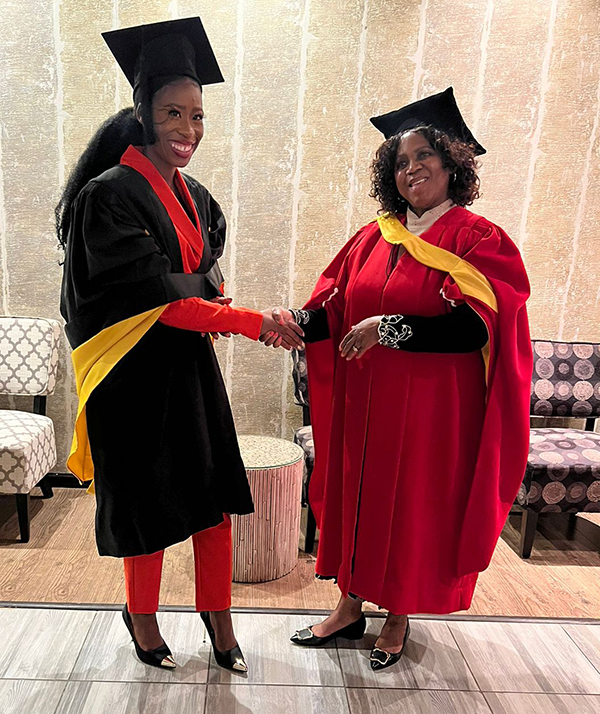North-West University (NWU) Setswana lecturer Reoikantse Shuping believes that the current approach to the standardisation of Setswana orthography needs to be revisited.
Reoikantse graduated on 17 May 2023, with a MA degree in Setswana.
She obtained the degree with distinction - a first for Setswana at the NWU’s Mahikeng Campus. As far as is known, she is only the third South African Motswana to achieve this, which makes this a double cause for celebration. Former NWU lecturer Theriso Tsambo and Dr Queen Motsepe, currently a lecturer at the Mahikeng Campus, both obtained their MA degrees cum laude at Unisa.
Reoikantse says despite being a written language with a very long history, Setswana writing and spelling still lack stability and consistency, even since the commencement of her study in 2020.
“The issue stems from different attitudes towards regulation and non-regulation. In the case of regulation, the problem lies in how decisions are reached to determine the correct standards. This has led to unnecessary variations and argumentations regarding the writing and spelling of words,” she says.
She adds that few people would disagree that establishing a standardised writing system for Setswana is crucial to ensure cohesion and prevent inconsistencies caused by non-regulation. It is for this reason that her study strongly recommends a consensus approach, which she has adapted from the sociological consensus theory.
Her research study is titled “Kanoko ya teseletso le taolelo mo mokwalong le mopeleto wa Setswana mo Aforika Borwa: ka Tiori ya Tumalano” (An investigation into regulation and non-regulation of writing and spelling of Setswana in South Africa with a consensus theory perspective).
It will surely make significant strides in addressing the long-standing challenge of standardising the writing and spelling of Setswana. It will also serve as a solid foundation for Setswana students, language practitioners and the wider Setswana-speaking community, helping them navigate the intricacies of Setswana writing and spelling.
By offering clarity on which standards to employ, where and when, the study will also contribute to language policies and benefit various structures. These include the Setswana National Lexicography Unit, the North West Provincial Language Committee and the Setswana National Language Body, all of which play critical roles in language development and standardisation in South Africa.
Reoikantse’s journey was far from easy, as she encountered numerous challenges along the way. One notable hurdle was the outbreak of the Covid-19 pandemic shortly after she registered for her degree in 2020. After the country mandated a five-month lockdown, students had to return home. This situation presented difficulties in accessing resources such as libraries and maintaining regular contact with her supervisor. However, her determination remained unshaken, and she persisted in pursuing her goal to complete her dissertation.
She attributes her achievement to collaboration and support from various quarters and instances, and says she is grateful to all those who have played a pivotal role in her research.
“Firstly, I appreciate the Grow Your Own Timber (GOOT) bursary I received from the NWU. This provided me with financial support throughout my journey.
“Secondly, I am grateful for the support of my supervisor, Dr Eileen Pooe of the subject group Setswana, as well as that of Prof Shole Shole, who initially guided me on this research path up to his retirement. Their expertise and general support proved invaluable,” says Reoikantse.
“Lastly, I extend my heartfelt thanks to my family and friends, whose advice and unwavering support greatly contributed to my success. Their willingness to assist whenever I sought guidance was truly remarkable.”

Reoikantse Shuping and her supervisor Eileen Pooe.
